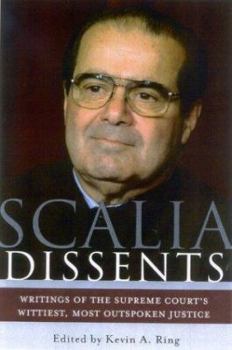Scalia Dissents: Writings of the Supreme Court's Wittiest, Most Outspoken Justice
Select Format
Select Condition 
Book Overview
Brilliant. Colorful. Visionary. Tenacious. Witty. Since his appointment to the Supreme Court in 1986, Associate Justice Antonin Scalia has been described as all of these things and for good reason. He... This description may be from another edition of this product.
Format:Hardcover
Language:English
ISBN:0895260530
ISBN13:9780895260536
Release Date:October 2004
Publisher:Regnery Publishing
Length:338 Pages
Weight:1.27 lbs.
Dimensions:1.2" x 6.3" x 9.3"
Customer Reviews
5 ratings
Best Book on Judicial Review
Published by Thriftbooks.com User , 19 years ago
This is a wonderfully written book. I haven't come across any writer who better explains the issues and Scalia's jurisprudence than Ring, including Scalia himself. In the first chapter, Ring clearly and crisply summarizes Scalia's interpretive methodology. The rest of the book is divided into various topics, such as separation of powers, abortion, race, religion, etc. Ring briefly explains the issues of selected cases in each topic, followed by excerpts from Scalia's (generally dissenting) opinions. Ring's greatest achievement is avoiding polemics entirely. This is emphatically not just a book for conservatives. It's just as much for liberals who actually believe in democracy. Ring keeps his eye on the ball by emphasizing that the central issue is separation of powers (a judicial issue), not whether a policy result is good or bad (a legislative issue). In Scalia's view, separation of powers is even more important than the bill of rights in securing our liberties. Congress cannot usurp executive or judicial powers, the President cannot usurp legislative or judicial powers, and the Supreme Court cannot usurp legislative or executive powers. Scalia's position on Constitutional rights is very simple. If the text of the Constitution does not explicitly protect the right and there was no tradition of protecting the right when the Constitution was ratified, it is not Constitutionally protected and that's the end of the analysis. If the right is to be protected, it's up to the elected members of Congress or the state legislatures, not five unelected life tenured lawyers. Any other methodology, such as one founded on the "living" Constitution or "evolving standards of decency," is nothing more than a legislative power grab. As Scalia often points out, how can an appointed committee of lawyers be better equipped to determine society's evolving standards of decency than legislators elected by that society? Abortion is a concrete example. It's not mentioned in the text of the Constitution and there was no tradition of protecting it when the Constitution was ratified. In fact, abortion was prohibited for two hundred years after ratification. So abortion cannot be a Constitutional right and its proponents are left to the democratic process. Instead, a majority of lawyers on the Court usurped the power to legislate on abortion. Demonstrations for and against abortion are now on the steps of the Court, instead of the state legislatures. Confirmation of Supreme Court justices has become a throughly political process. The focus is now on the political views of the nominee, not his or her judicial qualifications. All of this, of course, is to be expected from the Court's encroachment into the lawmaking power. The lawyers on the Court have become abortion referees deciding whether state laws place an "undue burden" (whatever that means) on the "right" to abortion. Scalia's prose can be a little dense, but his logical brilliance and wit
Scalia at his best
Published by Thriftbooks.com User , 20 years ago
This is an excellent book that makes a very difficult subject, the United States Constitution and an even more controversial Supreme Court Justice, Scalia, easy to read and understand. Ring has taken selected issues and presented them at three levels: The first level, the issue itself i.e. Abortion or Free Speech etc. and is his own words describes the issue. At the second level he has taken the specific case that relates to the issues and explains, in plain easy to understand language, the essence of the particular case. Finally he lets Scalia speak for himself with the actual text of Scalia's opinions written for the specific decision. You do not have to be a Constitutional Scholar to gain an understanding of the issues, the Supreme Court cases or Scalia's decisions. Actually Ring makes it fun to read about the law of the land. A must read for students of the U.S. Constitution.
buy it, read it, pass it around -
Published by Thriftbooks.com User , 20 years ago
The beauty of this book is that you dont need to know, or care, about the inner workings of the legal system to find this book both highly amusing and informative. Scalia's opinions have some of the most subtle and biting witticisms since (maybe) Shakespeare. Supreme Court rulings have an important affect on our daily lives, but youd be hard pressed to find anyone who can quote a passage or a court case in what the mainstream might consider a social setting. I'd bet youd find this author there though, and be pretty entertained throwing some of Scalia's quips around. Highly highly recommended
A must-read for all Scalia admirers
Published by Thriftbooks.com User , 20 years ago
Ring delves deep into Scalia's well-thought-out viewpoints while providing his own useful commentary. This is a surprisingly excellent read, both informative and historical.
Great Read, Very Informative
Published by Thriftbooks.com User , 20 years ago
Despite your political affiliation, this book captures the essence of Scalia's opinion and biting wit. While the prospect of reading a collection of legal rulings seems like a sure fire way to defeat insomnia, Scalia Dissents surprises by enlightening the reader on the issue and how Scalia interprets each with flair. Ring's choice of Scalia's opinions is excellent and his summary of the issues at hand makes the text accessible to all. Big thumbs up!






